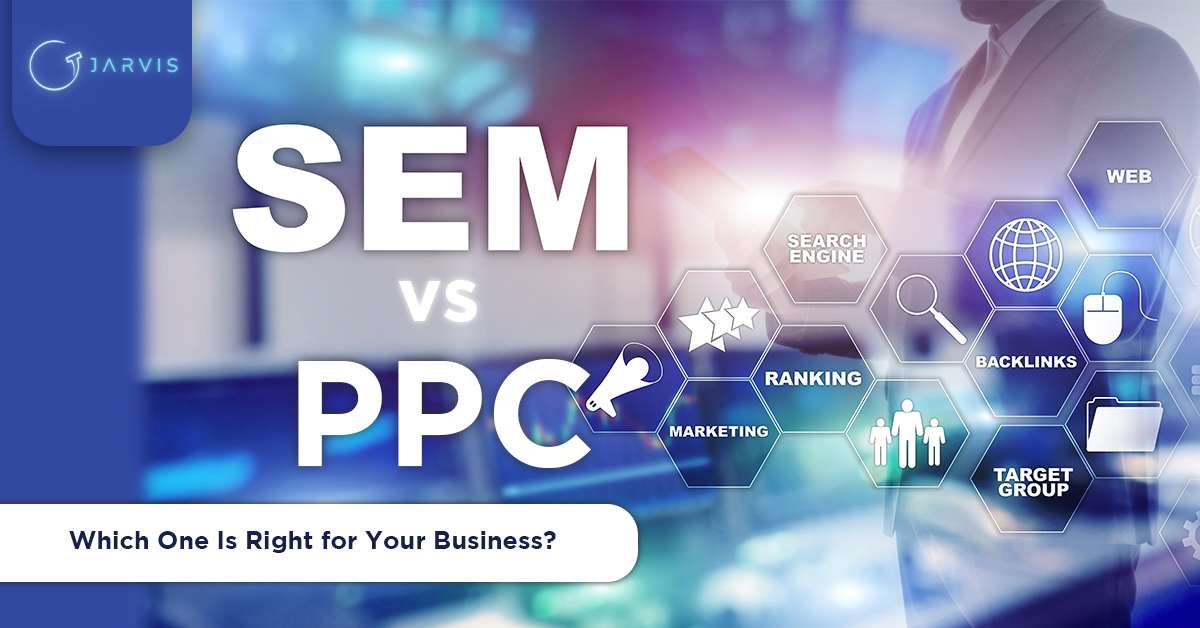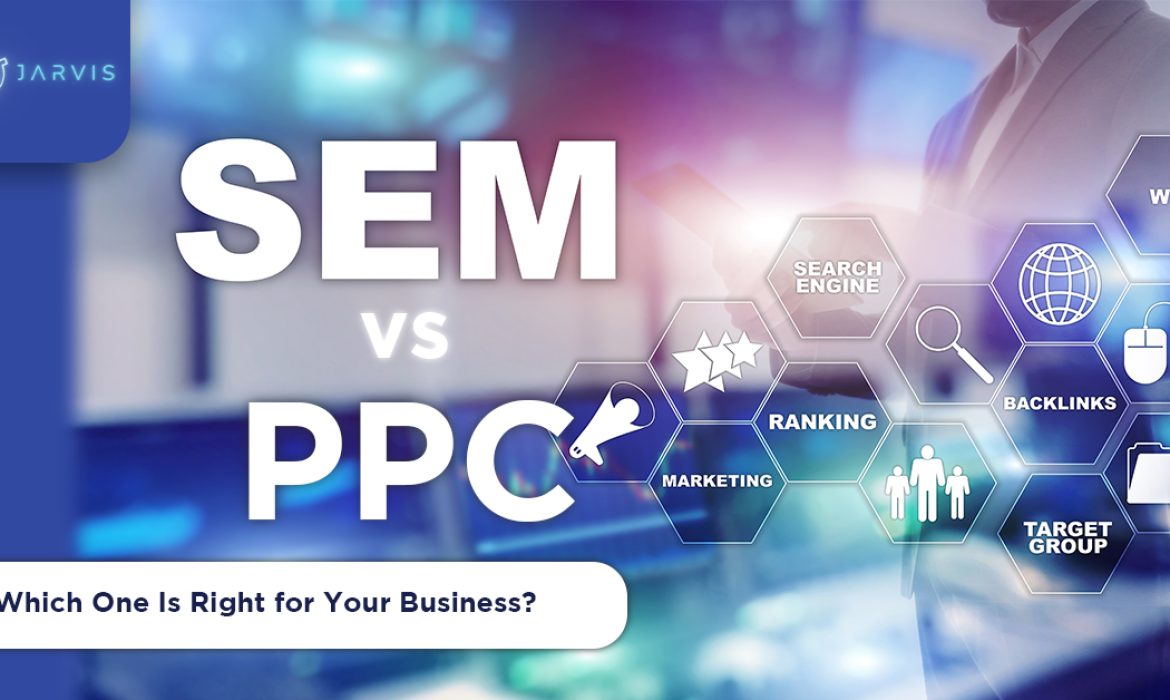SEM vs. PPC: Which One Is Right for Your Business?

When it comes to digital marketing, two of the most popular methods are Search Engine Marketing (SEM) and Pay-Per-Click (PPC). Both can be effective ways of increasing traffic and leads for your business. So which one should you choose? In this blog post, we’ll compare SEM vs. PPC to help you make the best decision for your business.
Why Digital Marketing?
Digital marketing is becoming increasingly important as businesses become more competitive and online markets become ever more crowded. Digital marketing enables companies to reach their target audience quickly, efficiently and cost-effectively, allowing them to make their products or services more visible in an increasingly competitive market.
Digital marketing can take many forms, from content marketing, search engine optimization (SEO), email marketing, display advertising and pay-per-click (PPC) to social media marketing and affiliate marketing. Each of these methods has its own advantages and disadvantages, so it’s important to choose the right one for your business. For example, PPC allows you to quickly and easily reach a wide range of potential customers, while SEO requires more time and effort to achieve the desired results.
Overall, digital marketing is becoming increasingly popular as more businesses recognize the potential benefits of leveraging digital channels to increase brand awareness, generate leads and ultimately boost sales. By taking the time to understand what methods are best suited to your business’s goals, you can ensure that you get the best return on investment from your digital marketing efforts
.
Pay-Per-Click (PPC)
Pay-Per-Click (PPC) is an online advertising method where advertisers pay only when a user clicks on an ad. This type of marketing allows businesses to target specific groups of potential customers who are actively looking for their products or services.
PPC works on a bidding system, where advertisers bid for placement on search engine result pages or other webpages. Each time a user clicks on the ad, the advertiser pays the amount that was bid. Advertisers have the ability to set budgets and can adjust their bids based on how much they are willing to spend on each click.
The advantage of PPC is that it is a relatively fast and cost-effective way to get your message in front of potential customers. Additionally, you can track and measure the performance of your ads in real-time and make adjustments to your campaigns as needed. The downside to PPC is that it can become costly if not managed properly, and there is a risk that you may be paying for clicks that don’t convert.
It’s important to understand how PPC works before investing in it. If done correctly, it can be an effective tool in helping you reach your goals.
Search Engine Marketing (SEM)
Search Engine Marketing (SEM) is a form of virtual advertising that makes a specialty of growing the visibility of a internet site or internet web page in seek engine consequences pages (SERPs). It typically involves the use of paid search ads, such as Google Ads and Microsoft Advertising.
SEM is a great way to promote your business online because it gives you control over the keywords you want to be associated with, as well as the ability to target specific audiences. With SEM, you can also create different ad campaigns and adjust the bids for each keyword. This allows you to maximize the return on investment (ROI) from your digital marketing efforts.
When it comes to SEM, there are many different strategies you can use, such as: keyword research, competitive analysis, creating relevant ad copy, testing different ad formats, setting up conversion tracking, and much more. Additionally, SEM also provides useful insights into customer behavior that can help you refine your targeting and optimize your campaigns.
Overall, SEM is an effective way to reach potential customers through organic search results and paid search ads. With the right strategy and tools, you can generate leads and increase sales for your business.
The Difference Between SEM and PPC
Search Engine Marketing (SEM) and Pay-Per-Click (PPC) are two different types of digital marketing tactics used to generate website traffic. While both tactics can be used in tandem, they each have their own advantages and disadvantages.
SEM involves using a combination of paid and organic tactics such as SEO, content marketing, and social media to increase visibility for your website in search engine results. The main focus of SEM is to drive traffic to your website by optimizing it for relevant search queries. This includes optimizing keywords, content, titles, and images.
PPC, on the other hand, focuses on buying sponsored ads to promote your website on search engines and social media platforms. Ads are placed in prime positions on the search engine results page, allowing businesses to target specific audiences with their messaging. PPC campaigns are often more targeted than SEM campaigns, and they can be set up quickly and efficiently.
The biggest difference between SEM and PPC is that SEM involves long-term optimization strategies, while PPC is more focused on immediate, short-term results. For businesses looking for quick results, PPC is usually the best option. However, for businesses who are looking to build a strong foundation for long-term success, SEM is often the better choice.
Pros and Cons of SEM
- SEM is an effective way to reach potential customers, as it allows businesses to target specific audiences using targeted keywords and phrases.
- It’s relatively low cost when compared to other forms of digital marketing, making it an affordable option for businesses on a budget.
- It’s highly measurable, allowing you to track your ROI and see which keywords and phrases are working best.
- It’s easy to adjust as needed, as you can quickly adjust bids, targeting, and budgets based on the results you’re getting.
- It can be time consuming to set up campaigns and monitor their performance.
- It can be expensive if you’re targeting a competitive keyword or phrase.
- It requires careful monitoring to ensure that you’re getting the results you want.
- It’s not always easy to measure the success of your campaigns
Pros and Cons of PPC
- Speed: Pay-per-click campaigns are one of the fastest ways to get your ads seen and generate leads.
- Targeting: You can target ads to specific locations, demographics, interests, and more to ensure you reach the right people with your message.
- Measurability: PPC campaigns are incredibly easy to track and measure, so you can see exactly how much money you’re spending and what results you’re getting from your efforts.
- Cost: PPC campaigns can be expensive, especially when you’re just getting started.
- Management: Managing a PPC campaign can be complicated and time-consuming, as it requires constant monitoring and optimization to ensure maximum results.
- Competition: Due to the cost involved, PPC campaigns can be competitive, making it difficult to stand out from the crowd.
Which One Is Right for Your Business?
Search Engine Marketing (SEM) and Pay-Per-Click (PPC) are both viable marketing strategies for businesses, and they have their respective advantages and disadvantages. While both methods are aimed at increasing the visibility of your website and creating leads, the best option for you depends on your specific goals and budget.
When it comes to deciding between SEM and PPC, you should consider both the pros and cons of each option.
SEM has a number of advantages, including the fact that it can help to boost organic rankings, reach more potential customers, and improve brand awareness. The downside is that it can be a bit more expensive than PPC, as it involves a larger investment in time and money.
Additionally, it can take some time to get results.
On the other hand, PPC is a great option for businesses looking for quick results. It’s cheaper than SEM and can yield great returns almost immediately.
However, PPC does require more knowledge and expertise to get the most out of it, and there’s no guarantee that you’ll make a return on your investment.
Ultimately, the right choice for your business depends on your specific goals and budget. If you’re looking for quick results and have the budget to invest in PPC, then this may be the right choice for you. However, if you have more time to devote to achieving long-term results and building organic rankings, then SEM may be the better option. It’s important to evaluate your situation and decide which option best fits your needs.
You can also read SEM Related Blogs:
What is search engine marketing, find out at jarvis marketing agency



